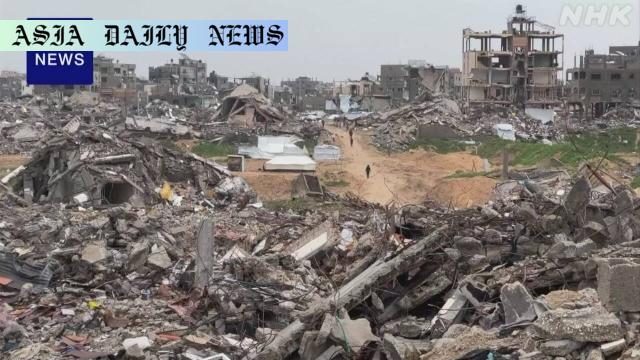Gaza: Displacement surges as millions face critical humanitarian challenges due to escalating conflict and restricted living space.
- Gaza faces massive humanitarian challenges with half a million displaced Palestinians.
- Israeli attacks restrict Palestinians to less than one-third of Gaza’s area.
- Escalation in bombing threatens the existing displacement crisis.
- UNRWA highlights worsening living conditions and ongoing threats.

Massive Displacement and Restricted Living Space in Gaza
The Gaza Strip is undergoing one of its most severe humanitarian crises in recent history. With the ongoing conflict between Israeli forces and Hamas, the United Nations Relief and Works Agency for Palestine Refugees (UNRWA) recently reported that nearly half a million Palestinians have been displaced in just one month. Alarmingly, this has forced the Palestinian population to inhabit less than one-third of Gaza’s already limited area. This reduction in livable space has not only intensified overcrowding but has also spurred concerns over the deteriorating humanitarian conditions within the enclave.
Israeli military orders for mass evacuations in Gaza have contributed to heightened fears among civilians. Many residents in northern Gaza have been urged to relocate further south, but safety and adequate living conditions remain elusive. Reports indicate that even the remaining parts of Gaza allocated to Palestinians are under the constant threat of aerial bombings and destruction, adding to an already devastating reality for the affected population.
Rising Casualties and Humanitarian Impact
The toll of the ongoing conflict extends beyond displacement. Reports of airstrikes, such as one targeting a tent shelter in Khan Younis that resulted in the deaths of five family members, including a pregnant woman and three children, underscore the tragedy faced by Palestinians. The surge in casualties paints a grim image, with hundreds injured and lives indefinitely disrupted. This escalation comes at the heels of a standoff between Israeli forces and Hamas regarding hostage negotiations. Israeli military chief Eyal Zamir stated that unless progress is made, operations within Gaza would intensify further.
The humanitarian organizations, including UNRWA, have been vocal in highlighting the dire conditions. Basic needs such as food, water, and shelter are becoming scarce, and medical facilities are overwhelmed due to injuries from the conflict. International calls for urgent intervention are growing louder as the situation worsens.
Political and Security Context of the Escalating Conflict
The ongoing crisis in Gaza is deeply intertwined with political tensions and security concerns between Israeli forces and Hamas. Amidst retaliatory actions, Israeli leadership continues to assert that Hamas bears responsibility for initiating the conflict and the miserable conditions now unfolding in Gaza. The hostilities are escalating in a region historically fraught with instability, and each military development further complicates prospects for peace.
For Palestinians living in Gaza, the restricted area offers no guarantees of security or respite. Even as international mediators attempt to de-escalate tensions, the lack of consensus on a permanent solution perpetuates the hardships faced by those in the conflict zone. With each day, the humanitarian toll of the crisis deepens, leaving many displaced individuals with little hope for immediate relief.
Global Responsibility and the Call for Immediate Action
The international community faces the moral imperative to intervene in the Gaza crisis. Nations and humanitarian organizations must prioritize aid, including food, medical supplies, and reconstruction efforts. Global leaders have a duty to hold discussions aimed at ending armed conflict, implementing ceasefires, and ensuring adherence to international humanitarian law. As one of the most densely populated areas in the world, Gaza requires concerted efforts not just to address the immediate crisis but also to lay the groundwork for long-term stability.
The plight of Palestinians in Gaza serves as a stark reminder of the devastating consequences of unresolvable conflicts. The need for urgent international cooperation has never been more apparent, as lives remain at stake amid explosions, displacement, and mounting despair.



Commentary
The Human Crisis in Gaza: A Tragedy Beyond Boundaries
The unfolding situation in Gaza is not just a local tragedy but a global moral crisis. The forced displacement of nearly half a million Palestinians in the span of a few weeks paints a grim picture of the humanitarian cost of the conflict. How can such a densely populated region withstand decades of political turmoil, compounded by extreme violence and displacement? The scale of suffering demands both reflection and urgent action from the global community.
Impact of Displacement on Civilization and Dignity
The harsh reality of displacement further strips Palestinians of their fundamental rights and dignity. Being forced to live in less than a third of Gaza showcases the limitations imposed not just on their movements, but also on their hopes to lead normal lives. Simultaneously, the remaining areas fail to provide a sanctuary, as frequent bombings leave residents in a perpetual state of fear and mourning. This level of human suffering challenges the conscience of the world and advocates for a reevaluation of international priorities.
The Call to Global Leaders for Collective Resolve
International leaders and organizations must rise beyond political interests and engage comprehensively to mitigate the crisis in Gaza. Refugees and displaced populations depend on swift humanitarian interventions, including access to food, water, shelter, and medical care. However, aid alone will not suffice; mechanisms that address the root causes of such conflicts must take center stage. Diplomacy, accountability, and long-standing negotiations are key to mitigating these crises in the future, even if they seem unattainable in the present whirlwind of hostility.
The tragedy unfolding in Gaza should ignite compassion, courage, and collaboration globally. While solutions may take time, the need to alleviate suffering and prevent further loss of innocent lives must remain a priority for humanity.